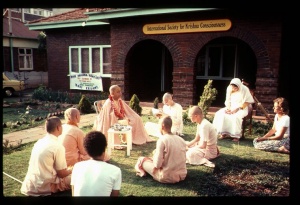SB 1.7.45: Difference between revisions
m (1 revision(s)) |
(Vanibot #0054 edit - transform synonyms into clickable links, which search similar occurrences) |
||
| (One intermediate revision by one other user not shown) | |||
| Line 1: | Line 1: | ||
{{info | {{info | ||
|speaker=Queen | |speaker=Queen Draupadī | ||
|listener=Lord | |listener=Lord Kṛṣṇa the Supreme Personality of Godhead and Arjuna | ||
}} | }} | ||
[[Category:Srimad-Bhagavatam - Canto 01 Chapter 07]] | |||
[[Category:Bhagavatam Verses Spoken by Queen Draupadi - Vanisource|010745]] | |||
<div style="float:left">'''[[Srimad-Bhagavatam]] - [[SB 1|First Canto]] - [[SB 1.7: The Son of Drona Punished|Chapter 7: The Son of Droṇa Punished]]'''</div> | |||
<div style="float:right">[[File:Go-previous.png|link=SB 1.7.44]] '''[[SB 1.7.44]] - [[SB 1.7.46]]''' [[File:Go-next.png|link=SB 1.7.46]]</div> | |||
{{CompareVersions|SB|1.7.45|SB 1964|SB 1972-77}} | |||
{{RandomImage}} | |||
==== TEXT 45 ==== | ==== TEXT 45 ==== | ||
<div | <div class="verse"> | ||
sa eṣa bhagavān droṇaḥ | :sa eṣa bhagavān droṇaḥ | ||
prajā-rūpeṇa vartate | :prajā-rūpeṇa vartate | ||
tasyātmano 'rdhaṁ patny āste | :tasyātmano 'rdhaṁ patny āste | ||
nānvagād vīrasūḥ kṛpī | :nānvagād vīrasūḥ kṛpī | ||
</div> | </div> | ||
| Line 17: | Line 23: | ||
==== SYNONYMS ==== | ==== SYNONYMS ==== | ||
<div | <div class="synonyms"> | ||
''[//vanipedia.org/wiki/Special:VaniSearch?s=saḥ&tab=syno_o&ds=1 saḥ]'' — he; ''[//vanipedia.org/wiki/Special:VaniSearch?s=eṣaḥ&tab=syno_o&ds=1 eṣaḥ]'' — certainly; ''[//vanipedia.org/wiki/Special:VaniSearch?s=bhagavān&tab=syno_o&ds=1 bhagavān]'' — lord; ''[//vanipedia.org/wiki/Special:VaniSearch?s=droṇaḥ&tab=syno_o&ds=1 droṇaḥ]'' — Droṇācārya; ''[//vanipedia.org/wiki/Special:VaniSearch?s=prajā&tab=syno_o&ds=1 prajā]-[//vanipedia.org/wiki/Special:VaniSearch?s=rūpeṇa&tab=syno_o&ds=1 rūpeṇa]'' — in the form of his son Aśvatthāmā; ''[//vanipedia.org/wiki/Special:VaniSearch?s=vartate&tab=syno_o&ds=1 vartate]'' — is existing; ''[//vanipedia.org/wiki/Special:VaniSearch?s=tasya&tab=syno_o&ds=1 tasya]'' — his; ''[//vanipedia.org/wiki/Special:VaniSearch?s=ātmanaḥ&tab=syno_o&ds=1 ātmanaḥ]'' — of the body; ''[//vanipedia.org/wiki/Special:VaniSearch?s=ardham&tab=syno_o&ds=1 ardham]'' — half; ''[//vanipedia.org/wiki/Special:VaniSearch?s=patnī&tab=syno_o&ds=1 patnī]'' — wife; ''[//vanipedia.org/wiki/Special:VaniSearch?s=āste&tab=syno_o&ds=1 āste]'' — living; ''[//vanipedia.org/wiki/Special:VaniSearch?s=na&tab=syno_o&ds=1 na]'' — not; ''[//vanipedia.org/wiki/Special:VaniSearch?s=anvagāt&tab=syno_o&ds=1 anvagāt]'' — undertook; ''[//vanipedia.org/wiki/Special:VaniSearch?s=vīrasūḥ&tab=syno_o&ds=1 vīrasūḥ]'' — having the son present; ''[//vanipedia.org/wiki/Special:VaniSearch?s=kṛpī&tab=syno_o&ds=1 kṛpī]'' — the sister of Kṛpācārya. | |||
</div> | </div> | ||
| Line 24: | Line 30: | ||
==== TRANSLATION ==== | ==== TRANSLATION ==== | ||
<div | <div class="translation"> | ||
He [Droṇācārya] is certainly still existing, being represented by his son. His wife Kṛpī did not undergo a satī with him because she had a son. | He [Droṇācārya] is certainly still existing, being represented by his son. His wife Kṛpī did not undergo a satī with him because she had a son. | ||
</div> | </div> | ||
| Line 31: | Line 37: | ||
==== PURPORT ==== | ==== PURPORT ==== | ||
<div | <div class="purport"> | ||
The wife of Droṇācārya, Kṛpī, is the sister of Kṛpācārya. A devoted wife, who is according to revealed scripture the better half of her husband, is justified in embracing voluntary death along with her husband if she is without issue. But in the case of the wife of Droṇācārya, she did not undergo such a trial because she had her son, the representative of her husband. A widow is a widow only in name if there is a son of her husband existing. So in either case Aśvatthāmā was the representative of Droṇācārya, and therefore killing Aśvatthāmā would be like killing Droṇācārya. That was the argument of Draupadī against the killing of Aśvatthāmā. | The wife of Droṇācārya, Kṛpī, is the sister of Kṛpācārya. A devoted wife, who is according to revealed scripture the better half of her husband, is justified in embracing voluntary death along with her husband if she is without issue. But in the case of the wife of Droṇācārya, she did not undergo such a trial because she had her son, the representative of her husband. A widow is a widow only in name if there is a son of her husband existing. So in either case Aśvatthāmā was the representative of Droṇācārya, and therefore killing Aśvatthāmā would be like killing Droṇācārya. That was the argument of Draupadī against the killing of Aśvatthāmā. | ||
</div> | </div> | ||
__NOTOC__ | |||
<div style="float:right; clear:both;">[[File:Go-previous.png|link=SB 1.7.44]] '''[[SB 1.7.44]] - [[SB 1.7.46]]''' [[File:Go-next.png|link=SB 1.7.46]]</div> | |||
__NOTOC__ | |||
__NOEDITSECTION__ | |||
Latest revision as of 18:13, 17 February 2024

A.C. Bhaktivedanta Swami Prabhupada
TEXT 45
- sa eṣa bhagavān droṇaḥ
- prajā-rūpeṇa vartate
- tasyātmano 'rdhaṁ patny āste
- nānvagād vīrasūḥ kṛpī
SYNONYMS
saḥ — he; eṣaḥ — certainly; bhagavān — lord; droṇaḥ — Droṇācārya; prajā-rūpeṇa — in the form of his son Aśvatthāmā; vartate — is existing; tasya — his; ātmanaḥ — of the body; ardham — half; patnī — wife; āste — living; na — not; anvagāt — undertook; vīrasūḥ — having the son present; kṛpī — the sister of Kṛpācārya.
TRANSLATION
He [Droṇācārya] is certainly still existing, being represented by his son. His wife Kṛpī did not undergo a satī with him because she had a son.
PURPORT
The wife of Droṇācārya, Kṛpī, is the sister of Kṛpācārya. A devoted wife, who is according to revealed scripture the better half of her husband, is justified in embracing voluntary death along with her husband if she is without issue. But in the case of the wife of Droṇācārya, she did not undergo such a trial because she had her son, the representative of her husband. A widow is a widow only in name if there is a son of her husband existing. So in either case Aśvatthāmā was the representative of Droṇācārya, and therefore killing Aśvatthāmā would be like killing Droṇācārya. That was the argument of Draupadī against the killing of Aśvatthāmā.